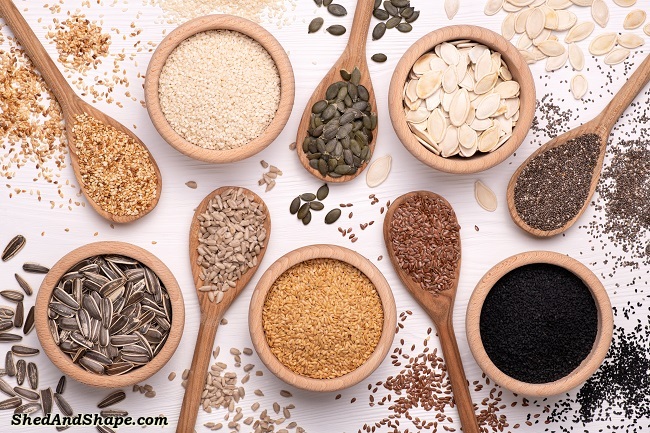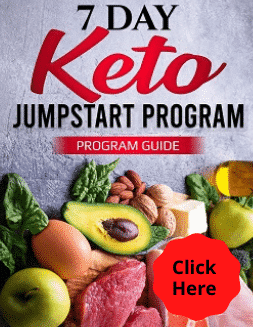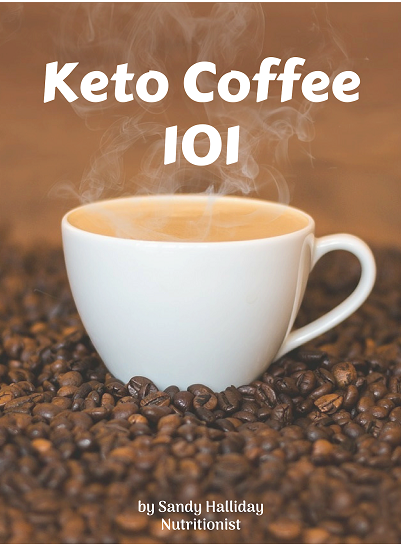The best seeds for keto are high in healthy fats and loaded with nutrients that are good for your health. They are also good sources of fiber, so essential for the keto diet.
Several studies have shown that different types of seeds can provide many health benefits, such as preventing weight gain and lowering the risk of heart disease. They can also help control blood sugar and blood pressure.
If you are going to include seeds in your diet, and you should, here’s a list of the best seeds for keto.
Best Seeds For Keto
1. Flax Seeds
With only 1 gram of net carbs per 3 tablespoon serving, flax seeds are a great addition to a keto diet. They also contain a healthy amount of dietary fiber, which helps improve digestive health and relieve constipation.
The health benefits of flaxseeds come from the fact that they are high in fiber and omega-3 fatty acids, as well as phytochemicals known as lignans.
Flax seeds have also been found to help lower high levels of LDL (low-density lipoprotein), also known as the “bad” cholesterol levels. This can minimize your risk of developing heart disease.
Related reading: Does Keto Lower Cholesterol?
Many nutrition experts suggest eating freshly ground flax seed instead of the whole seed since they can easily pass through your intestines undigested.. This means you could miss out on all of its benefits.
Flax seed tea
Whole seeds are useful for making flax tea which can help with low carb constipation. You simply put 1 tablespoon flax seeds in a cup, cover with just off the boil water, stilr well and leave in a cool place overnight. Next morning you eat the resultant “tea”. You can add a little zero carb sweetener and some lemon juice to make it more palatable if you like.
You can purchase flax seeds from supermarkets and health food stores in bulk, either ground or whole. One of the best ways to incorporate flax seeds to your keto diet is to add ground flaxseed to a low-carb smoothie or dip.
2. Chia Seeds
Chia makes a fantastic addition to any low carb diet. In fact, it’s a common ingredient in various keto recipes. This Keto Chia Pudding with Berries is but one example. Since they have excellent texture, chia seeds are commonly used as a thickener for many keto desserts.
As one of the best seeds for keto, chia seeds contain only 2 grams of net carbs per serving of about 2.5 tablespoons. They are also loaded with fiber, antioxidants, and minerals.
Like flax seeds, chia seeds can help improve digestive health thanks to their generous amount of fiber. The fiber in chia seeds is mainly soluble fiber, which helps lower LDL cholesterol and slows down digestion, preventing blood sugar spikes.
Since the surface of chia seeds are delicate and can break apart easily, they are a perfect addition to liquid foods, such as low-carb smoothies.
3. Poppy Seeds
Poppy seeds contain 2.4 grams of net carbs per ounce, so they are safe for low carb diets. Like most seeds, poppy seeds are high in fiber. A tablespoon of poppy seeds contains 1.7 grams of fiber.
They are also high in manganese, which is good for bone health. Poppy seeds are a great source of polyphenols, an antioxidant that can lower your risk of heart disease.
Deliciously crunchy, poppy seeds are commonly added to baked goods like bagels and muffins. But for the keto diet, you can use the seeds as toppings for low-carb breads. The poppy seeds are also cold-processed to produce oil, which is also ideal for keto.
Aside from adding them to baked goods, you can mix the poppy seeds into Greek yogurt, olive oil, and lemon zest for an easy low-carb salad dressing that you can also use as a dip.
Related reading: Best Yogurt for a Low Carb Diet
4. Hemp Seeds
Although not as popular as the other seeds for keto, hemp seeds are keto-friendly, having only 3.2 grams of net carbs per 100 grams.
Hemp seeds may be controversial since they are derived from the cannabis sativa plant, but they do not contain any traces of THC, the substance responsible for the psychological effects of cannabis. Therefore, eating hemp seeds is totally safe.
Hemp is loaded with good fats, which is why it’s a great addition to keto. Another reason hemp seeds are the best seeds for keto is they contain a good amount of digestible protein.
The great thing about hemp seeds is you can add them to almost anything, so it’s easy to incorporate them into your keto diet. They have a creamy texture and a mild nutty flavor, perfect for salads or smoothies.
5. Pumpkin Seeds
Each 1 oz serving of pumpkin seeds contains only 1.3 grams of net carbs so they are a great addition to any low carb diet. Several studies confirm that pumpkin seeds have an excellent nutrition profile, offering many benefits for your health. They are a good source of unsaturated fatty acids, protein, vitamins, and minerals.
There are many fantastic ways to incorporate pumpkin seeds into your low carb diet. You can have them roasted and eaten as snacks or mix them with other low carb seeds and nuts. Like other seeds, you can add them to keto-friendly baked goodies.
Related reading: Best Nuts for Ketosis
6. Sesame Seeds
There is only 1 gram of net carbs in a tablespoon of sesame seeds. Aside from being low in carbs, sesame seeds are high in protein, vitamins, minerals, and antioxidants. They are often added to low carb recipes to provide a crunchy texture and nutty flavor.
Sesame seeds can help lower cholesterol levels. They contain phytosterols, which help to enhance the body’s immune response and lower your risk of cancer.
Sesame seeds are available in different colors, but the darker ones have the most flavor. They can be used as a garnish for low carb savory dishes or a topping on low carb bread.
Here’s a Sesame Bread recipe to follow. You can also eat them raw or toast to bring out their natural nutty flavor.
7. Sunflower Seeds
With 11 grams net carbs per 100 gram serving and a healthy amount of fats, it’s easy to see why sunflower seeds are among the best seeds for keto, despite having a few more net carbs compared to the other seeds on the list.
The healthy fats in sunflower seeds can help lower your risk of cardiovascular diseases, including high blood pressure. Sunflower seeds are higher in omega 6 fats than omega 3 and some health experts say that many people who have been eating the Standard American Diet have been eating too many omega 6 fats and not enough omega 3,
They advise against eating too many foods with high omega 6 fats as they should be in a certain ratio with omega 3 fats. A high ratio of omega 6 to omega 3 can lead to inflammation in the body. Of the seeds flax seeds and chia seeds are better in this respect.
Sunflower seeds contain many vitamins and minerals that can help improve your immune system, increasing your body’s ability to fight diseases. They contain zinc and selenium, which helps to improve your body’s immune response.
Antinutrients in sunflower seeds
They do have a downside in as much as the seeds contain a high level of phytic acid and enzyme inhibitors. The phytic acid can prevent the absorption of minerals from the digestive system while the enzyme inhibitor can prevent you producing digestive enzymes.
Soaking and sprouting the seeds is said to reduce the phytic acid and increase the nutrient content. To do this you simply put some seeds in a container and cover them with clean water and allow to soak for about 2 hours.
Then drian well and leave them in a dark place to sprout. You sould rinse them several times a day then store in the fridge once the little sprouts appear.
Sunflower seeds are sometimes sold with a shell and eaten roasted or raw. You need to crack the shell open to take the seeds out and eat. Alternatively you can buy them already out of the shell.
You can sprinkle the sprouted sunflower seeds on your favorite salad. You can also add them to trail mix for snacks.
Final thoughts on Best Seeds For Keto
Seeds are filling and versatile foods that are great for low-carb diets like keto. They add crunch and flavor to keto-friendly meals, including snacks and desserts. The best seeds for keto are excellent sources of healthy fats, fiber, protein, vitamins, and minerals.










